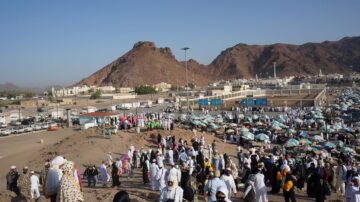Many geographical sights were scenes of important historic events. The mountains in the area of Al-Madinah Al-Munwwarah witnessed significant events in Islamic history. Among these mountains is Mount Uhud, which was the scene of the famous Battle of Uhud.
Mount Uhud is located 5 kilometers (3.1 miles) north of Madinah. Uhud has an attractive look. The Prophet (peace and blessings be upon him) felt relieved on seeing it, and the people of Madinah also loved it very much.
Mount Uhud extends from east to west with a slight slope towards the north. It is 7 kilometers (4.3 miles) in length and from 2 to 3 kilometers (1.2 to 1.9 miles) in breadth. Most of its stones are of red granite, and some parts of it are almost dark green and black. It contains some natural cavities (called maharis) where rain water is collected. The rain water remains throughout the year, for these cavities are not exposed to the rays of the sun. Close to Mount Uhud there are some small mounts, like Thawr and `Aynayn. Mount Thawr is located northwest of Uhud, while `Aynayn is situated to its southwest.
In 3 a.h. Mount Mount was the scene of the famous Battle of Uhud. The battlefield was the space between the southwestern base of Mount Uhud and Mount `Aynayn Mount, a distance of about 1 kilometer (0.6 miles).
Mount Uhud is also called the Archers’ Mount because it was the field where the steadfast archers in the Battle of Uhud were killed. The people of the Quraysh, upset at their defeat in the Battle of Badr in 2 a.h., wanted to avenge their dead. In coalition with some other tribes, they gathered a large force to attack the Muslims in Madinah. They positioned themselves near the hills of Uhud.
The Prophet (peace and blessings be upon him) marched out with the Muslims to confront them. The Prophet (peace and blessings be upon him) took up his position below the hill. He (peace and blessings be upon him) arrayed the army in fighting formations, and fifty archers were posted on Mount `Aynayn under the leadership of `Abdullah ibn Jubayr to guard the army from any attack from the rear. They had strict orders not to leave their post, whatever the outcome of the battle.
The two armies engaged in fighting. The Muslims seemed to have won victory over the Makkans, who fell back in disorder after paying a heavy toll. The Muslims started gathering the booty. Thinking that the fight was over, the majority of the Muslim archers left their posts to gather the spoils, disregarding the orders of their leader to stay in their positions.
On seeing the archers leaving their posts, Khalid ibn Al-Walid, who had not yet embraced Islam, seized the opportunity and gathered a group of the Quraysh fighters, killed the rest of the archers, and launched a furious attack from the rear. The Muslims were taken so much by surprise that they did not know what to do. In the general melee their ranks got disorganized. Seventy of the Prophet’s Companions, including Hamza ibn `Abdul Muttalib, the Prophet’s uncle (may Allah be pleased with them), were killed.
After the battle was over, the martyrs were buried in the field of the battle. The Prophet (peace and blessings be upon him) would visit their graves and pray for them.
The Muslims have followed in the footsteps of the Prophet (peace and blessings be upon him) in that regard.
Mount Uhud had a special place in the heart of the Prophet (peace and blessings be upon him). There were many hadiths reported regarding that.
`Abbas ibn Sahl reported from Abu Humayd who said: We went out along with Allah’s Messenger (may peace and blessings be upon him) in the expedition of Tabuk. We proceeded until we reached the Valley of Al-Qura and Allah’s Messenger (may peace and blessings be upon him) said, “I am going forth, so he among you who wants to move fast with me may do so; and he who likes to go slowly may do so.” We proceeded until Madinah was within our sight, and he said, “This is Uhud, the mountain which loves us and which we love.”
Qatadah reported from Anas ibn Malik (may Allah be pleased with him) who said: Allah’s Messenger (may peace and blessings be upon him) said, “Uhud is a mountain which loves us and which we love.”
By Mahmoud Isma`il Shill

